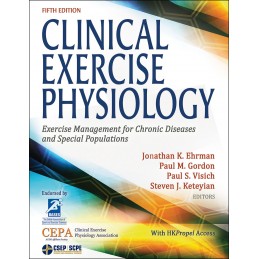Clinical Exercise Physiology, Fifth Edition With HKPropel Access, is a comprehensive guide to the clinical aspects of exercise physiology, investigating 24 chronic diseases and conditions and addressing a variety of populations. The text has been a mainstay in the field since its inception in 2003 and is an ideal resource for students preparing for clinical exercise certifications, including those offered by the American College of Sports Medicine (ACSM-CEP), American Council on Exercise (Medical Exercise Specialist), Canadian Society for Exercise Physiology (CSEP-CEP), and Exercise & Sports Science Australia (ESSA-AEP).
Clinical Exercise Physiology, Fifth Edition, employs a logical progression of content to provide greater coverage and depth of diseases than is typically found in most clinical exercise physiology textbooks. It examines the effects of exercise on 24 chronic conditions, with each chapter covering the epidemiology, pathophysiology, clinical considerations, drug and surgical therapies, and exercise testing and prescription issues for the chronic condition. Other chapters are devoted to examining exercise-related issues for four special populations.
Each chapter in this fifth edition is revised and updated to include the latest research, clinical guidelines, and position statements from professional organizations. In addition, it incorporates the following new elements::
- An upgrade to a full-color layout, for a more engaging learning experience and enhanced presentation of data
- New Clinical Exercise Bottom Line sidebars that highlight key information a clinical exercise physiologist needs when working with clinical populations
- A new chapter on clinical exercise programming that offers detailed recommendations for clinical populations
- A completely rewritten chapter on spinal cord injury and updates throughout each chapter to reflect the most up-to-date guidelines and position statements
- Expanded coverage of clinical exercise physiology certification options
In addition to practical application sidebars throughout the text, the fifth edition also has related online tools to support student learning. Delivered through HK
Propel, more than 60 case studies are presented in a SOAP note format so students can explore clinical evaluations, looking closely at subjective and objective data, assessments, and plans. Discussion questions and interactive key term flash cards foster better understanding and retention, while chapter quizzes can be assigned by instructors through the platform to assess student comprehension.
Endorsed by the Clinical Exercise Physiology Association (CEPA), the Canadian Society for Exercise Physiology (CSEP), the British Association of Sport and Exercise Sciences (BASES),
and Exercise & Sports Science Australia (ESSA),
Clinical Exercise Physiology, Fifth Edition, offers a contemporary review of the variety of diseases and conditions that students and professionals may encounter in the field. New and veteran clinical exercise physiologists, as well as those preparing for clinical exercise certification exams, will appreciate the in-depth coverage of the clinical populations that benefit from physical activity.
Note:: A code for accessing HK
Propel is included with all new print books.




 Delivery policy
Delivery policy
 Security policy
Security policy
 Return policy
Return policy
